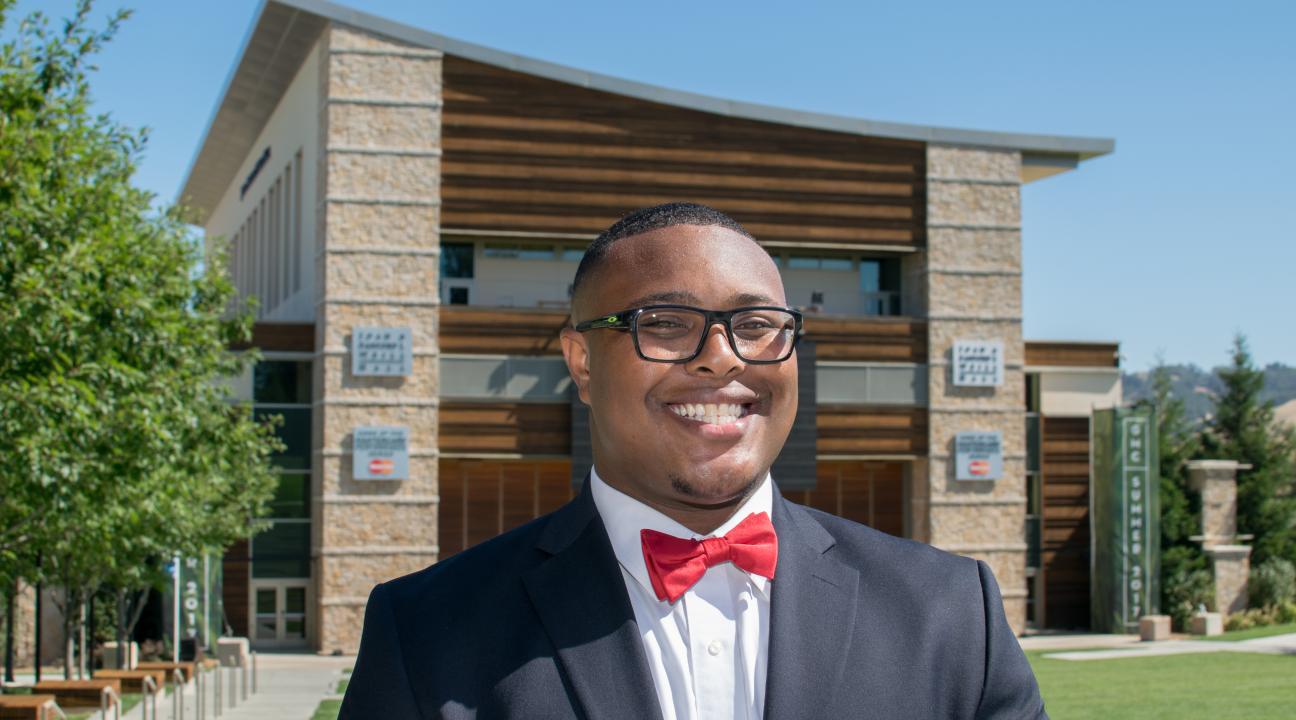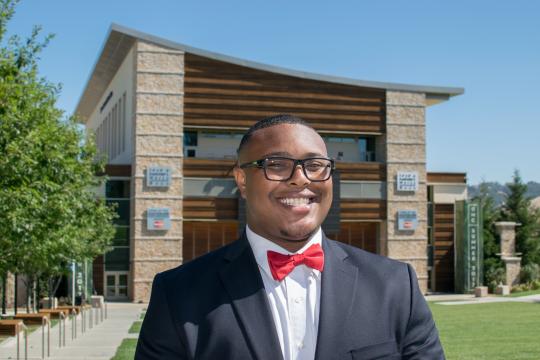Rebuilding Community
Despite Challenges, Fraternity's Lone Member Organizes 30-Year Reunion On Campus
When he took on the task of inviting guests from around the country to a celebration he agreed to organize honoring Kappa Alpha Psi’s 30-year history at Sonoma State University, Malik-Charles Wade knew it wouldn’t be easy. After all, even though the international, predominantly African-American fraternity founded at Indiana University in 1911 has been on campus for three decades, Wade, a music major scheduled to graduate next spring, is currently the only member of Sonoma State’s Mu Omega chapter.
Now he was taking the lead planning a three-day campus celebration and reunion scheduled to begin Friday, July 28 with a banquet in the Student Center for some 100 fraternity brothers, family members and friends. There is also a “Step N Stroll” contest and a guest DJ from Howard University the following night, a barbeque and other activities through Sunday. A centerpiece of the weekend will be a commemoration celebrating Leroy Worthy, who chartered the fraternity at Sonoma State and passed away a few months ago. Members say it was the first Greek organization on campus at the time.
No sooner did the organizing begin when some members coming from as far away as Georgia questioned why the celebration wasn’t being held elsewhere. The skeptics reminded Wade that only about 2 percent of the university’s current undergraduates are African-American. In Kappa Alpha Psi’s early years, they pointed out, the portion of African-American students on campus was more than twice as high.
“A lot of guys are coming back who have not seen the campus for some time,” said Eldrid Bryant, a former Sonoma State football player and 2001 graduate who now owns and operates an airport shuttle in and around Los Angeles. “We want to raise visibility and awareness because when you have a truly diverse community, it helps people learn more about each other than just failing into the trap of believing the stereotypes.”
But some fraternity brothers were reluctant to commit. “Let’s just say a lot of the members from around the country were not at all confident that Malik could pull it off,” said Andre Bailey, an advisor in Sonoma State’s Educational Opportunity Program, which is known around campus as EOP. “People suggested having it at the casino. They said let’s have it in San Francisco.
“It probably would have been easier to have it somewhere else. But Malik was very adamant he wanted the celebration to be held here at Sonoma and he has been making it happen. I have been beyond impressed with this young man’s attitude, his optimistic outlook and with his ability to deal with setbacks and pressure and get things done.”
Setbacks are nothing new to Wade. His parents, he pointed out, met in prison while serving time on assorted felony convictions. “I’m proud of my parents for putting that life behind them and getting things together,” he said, adding that he was raised by his father in Novato. He didn’t see his mom much when he was growing up because the couple separated when Wade, who turns 22 in August, was 11 years old.
A talented singer and musician who plays clarinet and just about every other wind instrument imaginable, Wade's relative domestic harmony was shattered when his father died in 2010. The parents of a close friend became his legal guardians, but after living with them from 15 to 17, they had a change of heart, Wade said. He was on his own.
Not sure who to turn to for guidance or support, he came to Sonoma State. He met Bailey when he went to the EOP office to find out why he wasn’t accepted into the program that offers economically disadvantaged students financial, academic and other support.
As it turned out, Malik’s guardians had failed to file some of the forms necessary for admittance into EOP. But all was not lost. He was eligible for the university’s Seawolf Scholars program because he had been in the care of court-appointed guardians.
That made him a candidate for financial and other support. More importantly, it brought Wade into contact with Bailey, who also happened to be a proud Sonoma State alum and member of Kappa Alpha Psi when it had a larger membership.
“At that point, I was under the impression that I had to figure out everything by myself,” Wade said. “I didn’t have anyone to turn to for support. But Andre took an immediate interest in me and would tell me I belonged here, that I worked hard to get to Sonoma and now I needed to figure out the reason I was here and what I wanted to do with my life. Truth is, I would not be here today if not for Andre Bailey and the support he showed me.”
Bailey, who wiped tears from his eyes when Wade talked about much the EOP advisor has meant to him, introduced Wade to the fraternity as another way to find a sense of community and belonging. After a tough first year that saw his grades sink so low he risked being thrown out, Wade, who was homeless for a short time after his freshman year, buckled down and started to excel.
By joining the fraternity, he met other mentors and role models. Now, hoping for a career teaching music, he wants to give something back. He’s eager to remind people that African-American students can thrive at Sonoma State, just as he has done.
With just a few days to go before guests start arriving, Wade and Bailey are still raising some additional funds to pay for everything that’s been planned and promised. But people seem genuinely excited about coming to campus, seeing old friends, catching up and helping to make a statement about life at SSU.
“Sonoma State is a great school. It’s home to me in a lot of different ways,” said Mike Henry, a star football player and track athlete who graduated in 1990 and now teaches and coaches football at Bellarmine College Prepatory in San Jose.
“I met my wife there. I made so many good friends at Sonoma. The fact that we were able to found a chapter of Kappa Alpha Psi there is one of the things I’m most proud of in my entire life. Honoring Leroy and encouraging kids to come to Sonoma is a part of why I want to be there next weekend.”
As Wade tells his mom these days when she asks if he needs anything – she lives in Chicago now and their relationship is solid—“I just say I want a college education and I’ll be okay from there. I’ll be fine.”
—Gary Delsohn



